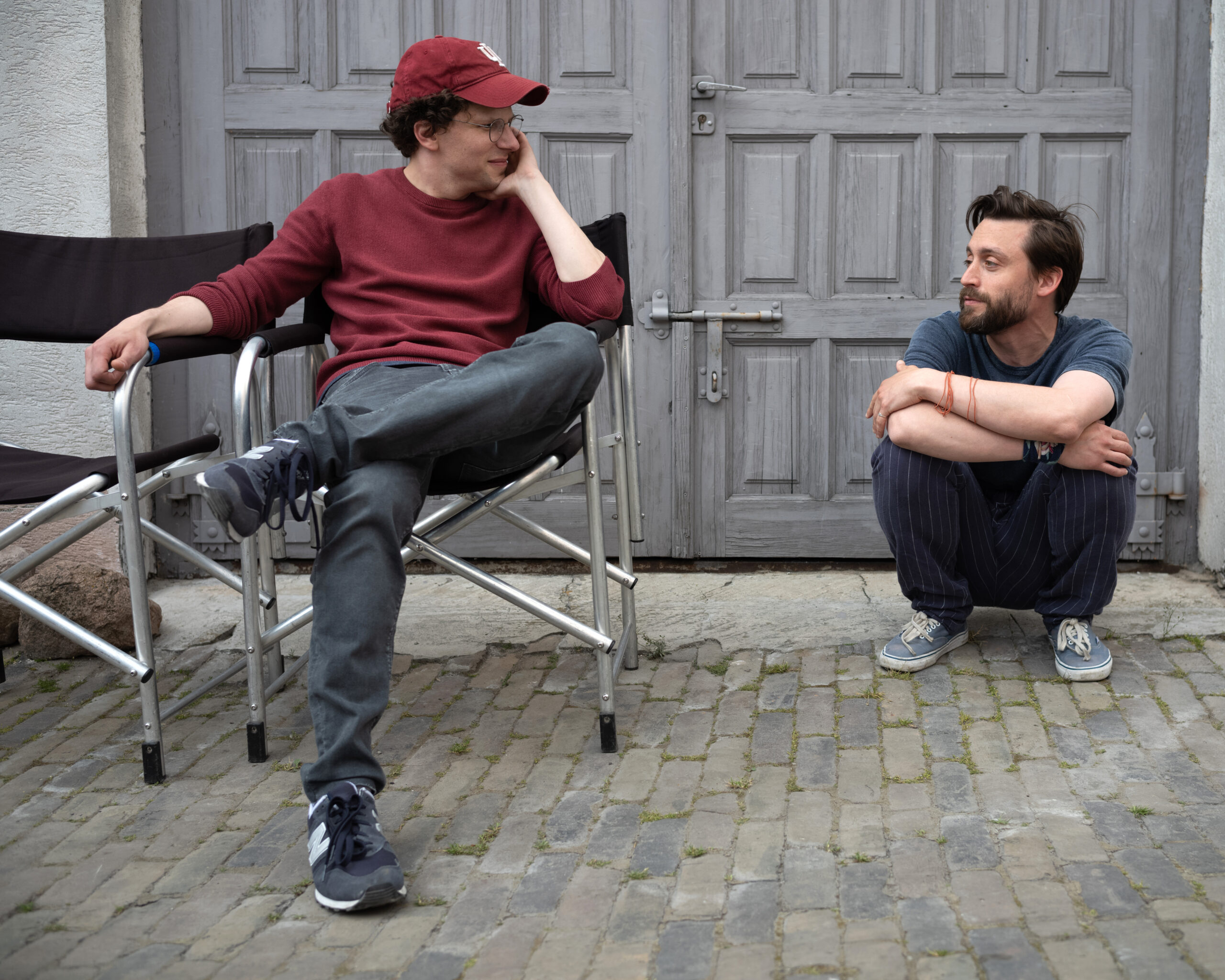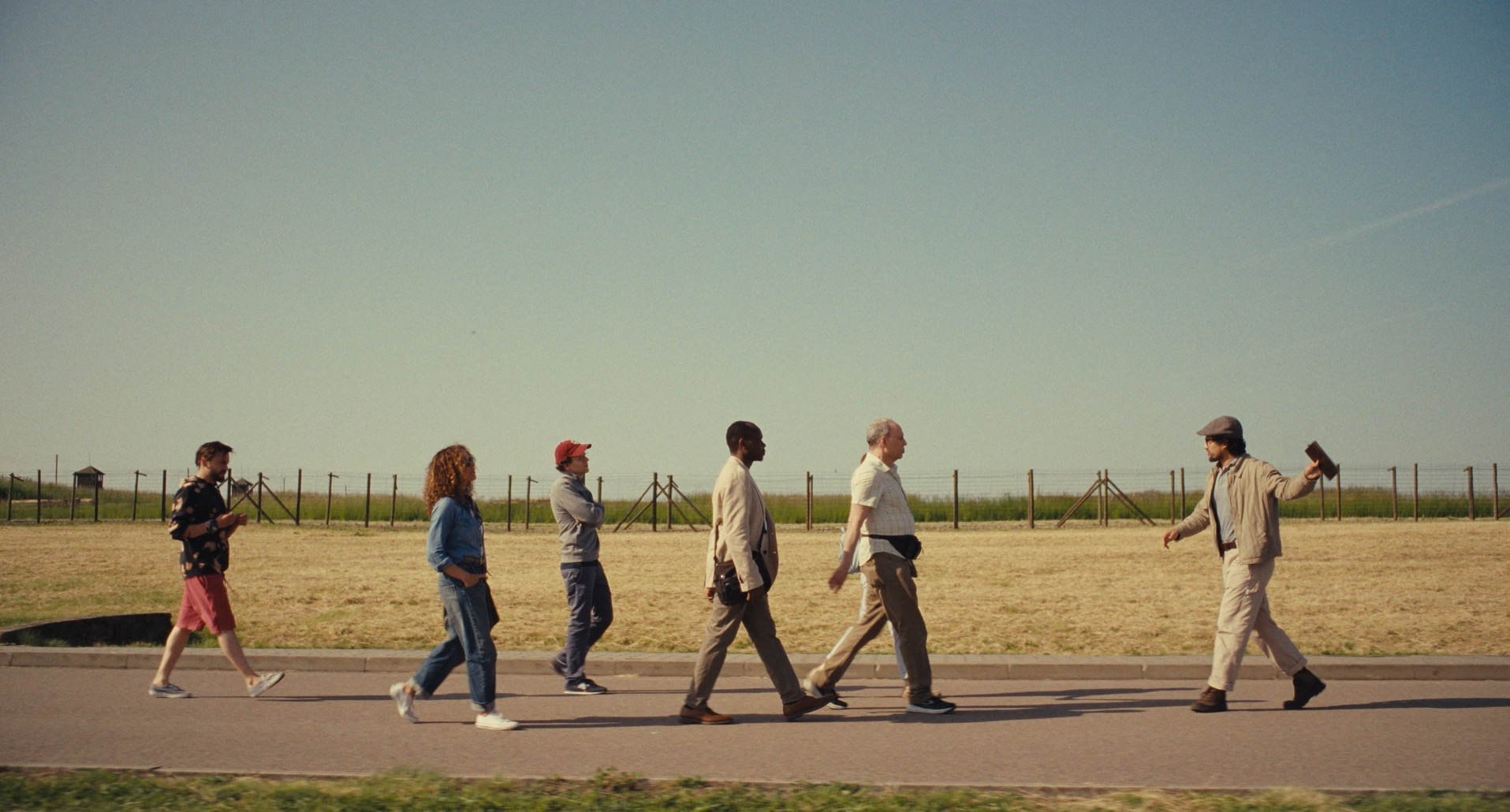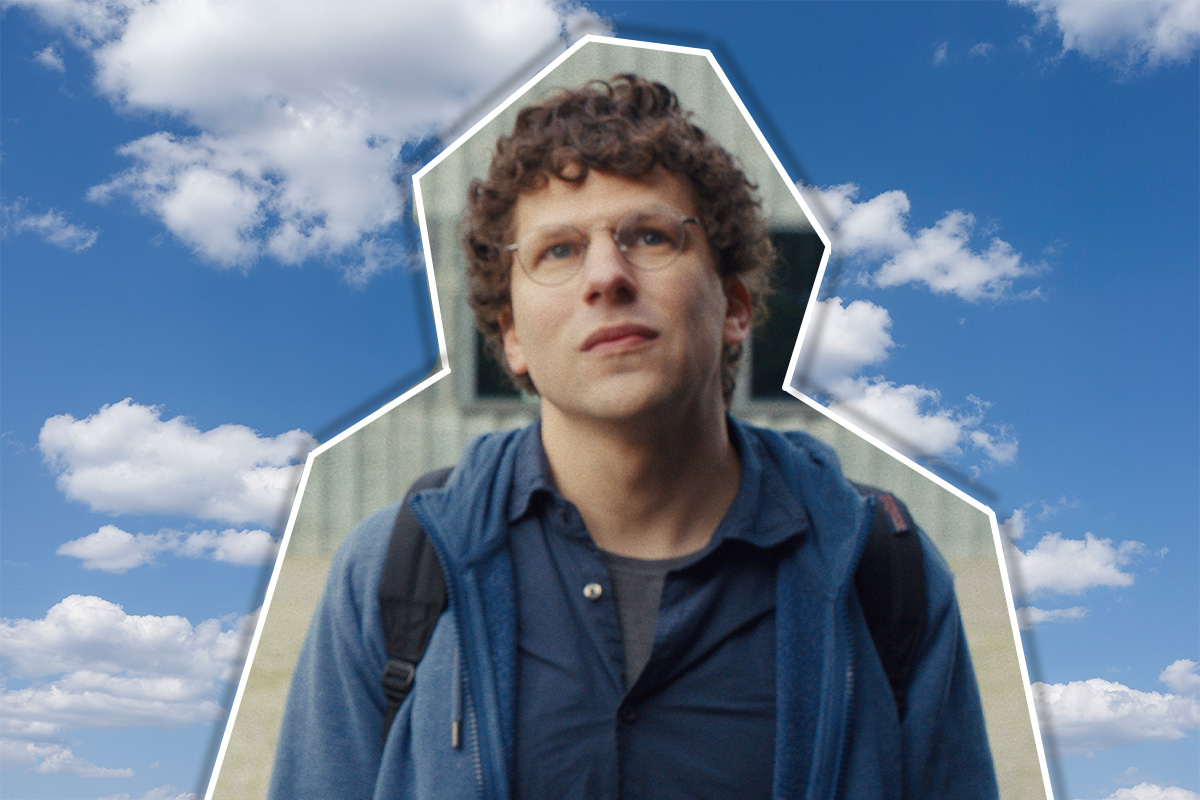When I enter the Zoom meeting, Jesse Eisenberg is floating in the clouds. Literally. His Zoom background is of a blue sky and white puffs of cumulus. The camera framing shows Eisenberg’s entire seated body in the center of the shot, an enthroned figure floating in the heavens. It’s almost how one, as a child, might imagine God. Except, instead of a heavily bearded giant man draped in white robes, before me was the 41-year-old Jewish actor and filmmaker. His regular, recognizable mop of brown curls had been straightened and his right middle finger bore a splint.
This is not what I had expected. But in a way, talking with this version of Jesse Eisenberg about his new film “A Real Pain,” which explores the legacy of Holocaust trauma, as he seemingly hovers in the sky is completely apt. “A Real Pain” itself is full of contradictions.
The movie, which releases in theaters tomorrow, focuses on cousins David (Eisenberg) and Benji Kaplan (Kieran Culkin) as they go on a Holocaust tour after the death of their survivor grandmother, Dory. Both anxious, socially awkward David and hyper emotional yet charming Benji are in pain. They are in pain from the problems in their lives, the death of their grandmother and the backdrop of the horrors their Jewish family faced. And yet “A Real Pain” is effortlessly funny. In one scene, the cousins sneak onto a train without paying for tickets. Benji justifies it by saying as Jews, they shouldn’t have to pay to take a train in Poland. In another scene, Benji urges David to take a photo with him on the Warsaw Uprising Monument and instead, David ends up taking photos of Benji with everyone else on the tour. The tenuousness and incongruity of David and Benji’s own relationship heightens the comedy and the tragedy of their stories.
So, too, is the movie itself a contradiction. Yes, “A Real Pain” is essentially fictitious — Eisenberg was inspired to write the film after coming across an online advertisement for tours of Auschwitz “with lunch.” But many narrative elements and histories within the film are true to Eisenberg’s own life. His family lived in Krasnystaw, Poland until the second World War, and he specifically filmed the movie there. Additional filming took place in Lublin, Warsaw and Kraśnik, Radom, where Eisenberg’s family and and the family of his wife Anna also hail from. Grandma Dory in “A Real Pain” is inspired by Eisenberg’s late, paternal great-aunt Doris, who was born and lived in Krasnystaw until 1918. (Though Aunt Doris was not herself a Holocaust survivor, her first cousin, whom Eisenberg spent some time with, was.) At the end of the film, David and Benji visit Grandma Dory’s ancestral home, and Eisenberg chose to film the real house where his great-aunt lived. He also chose to use his real-life son Banner to portray his character David’s son, Abraham.
The list goes on and on.
As unforeseen as the surface-level circumstances of my conversation with Jesse Eisenberg were, however, what I did correctly predict was the genuine care with which he created “A Real Pain.” In the proceeding, all-too-quick 15 minutes, Eisenberg was kind and thoughtful, answering my questions in depth. He even worried aloud at one point that he was “man-Jew-splaining” to me. (He was not.) We discussed the degree to which generational pain is insurmountable, the experience of filming at Majdanek and his remarkable real-life friend who inspired a character in “A Real Pain.”
This interview has been lightly edited and condensed for clarity.
“A Real Pain” is obviously very personal for you. Did making the film change or clarify anything about the way you think about your family’s own history?
Thank you so much for your question. Yeah, it did. I mean, it didn’t answer any questions that I’ve had, but it did just kind of ground some of the questions I had in some greater authenticity and history. I’ve always had a kind of ambivalent relationship to my family’s history because I didn’t know much about it. I come from people racked with survivor’s guilt who didn’t want to talk about what happened to their family. So I started to investigate on my own — when I say ambivalent, I just mean it was never something that was talked about openly. My family’s history was something that I had to investigate myself. And [I have] an ambivalent feeling about my faith because I live in the modern world, and there’s not a lot of room or demand for it in the way I live my life. I’m a secular person in the arts, so I’m not surrounded by it.
But the real answer is that I’ve always had trouble reconciling my own personal anxieties and misery with the horrors that my family experienced. I could never understand how it’s possible for me to feel so bad about myself, for me to not be able to, you know, get out of bed for a week because I’m depressed, when I knew what happened to my ancestors. It was this cognitive dissonant thing in my head: Shouldn’t I be jumping for joy at every moment, at every smell of a flower and fresh breath of air and sweet fruit that I can eat, because my family had been through such terror? For whatever reason, I was never able to reconcile those two things. “A Real Pain” is really an attempt at that. It presents these two characters. I play David, Kieran Culkin plays Benji, and we both have our inner demons. I set these characters against the backdrop of something so much more horrific, and try to ask the audience to contemplate: What is real pain? Are modern day petty grievances really painful against the backdrop of this? And the answer is, yeah, they are. But how? And to what degree? And what value do we ascribe to pain when something is so objectively worse?
I see David and Benji as being kind of two parts of the same psyche. But do you see yourself relating more to David or Benji?
I guess I relate more to David, the character I play. I’m somebody who feels self-conscious, my default would be something more shy and reserved. And also, I envy people like Benji. Benji, and especially as played by the brilliant Kieran Culkin, is somebody who wears his emotions and his joy on his sleeve. He commandeers groups through charm and bullying. He’s somebody who I look at and just marvel at how he’s able to walk through the world. All the feelings that I express about him in this movie are feelings that I have about men like this, people who just seem so at ease in their own skin. Even when they’re experiencing deep, deep grief, they even feel more grounded in their own misery than I do. And that’s even paradoxically enviable.

It was fascinating to see the different ways that David and Benji deal with their grief and their pain. But I was also interested that at the end of the movie, they are where they started out at the very beginning. To me, this suggested the idea that generational pain is in some ways insurmountable. Is that an idea you were writing towards in the script?
I was less trying to make a commentary on generational pain, and more about just these two guys who navigate the world very differently in terms of pain. To your point, you know, my character has just figured, “I’m going to live with this kind of anxiety, misery, depression, obsessive compulsive disorder, and I’m going to just bury it. I’m gonna take medication. I’m gonna move on with my life. If I feel a panic attack coming on, I’m going to jog.” He’s just a normal modern day New Yorker who can afford a therapist. And Kieran’s character, on the other hand, if he feels something, he feels it fully. He feels it to the point where it’s paralyzing, but also he feels joyfully. I’m trying to, I guess, show these two reactions to growing up with that history. And neither reaction is actually perfectly satisfying. Kieran’s character is stuck in a limbo state, a kind of purgatory of his own making, where he can never really escape his own demons. And my character is just so encumbered with his own anxieties and self-consciousness that actually he’s stuck too. I guess I wasn’t really thinking about this consciously until you brought it up. But I guess perhaps I was trying to show the way that this third-generation grief can manifest, and how neither solution is working for them.
I also really appreciated the character of Eloge. In my experience, growing up in the Jewish community, I feel like you learn about the Holocaust in a bubble, without putting it in conversation with other instances of mass violence. I was curious if that was something you were conscious of when you were writing that character?
Eloge is a character who survived the Rwandan genocide, moved to Canada and converted to Judaism. And he’s based on my friend Eloge, who did all these things and is this unbelievable guy. I’m seeing him tonight for the first time in a year at the premiere. When I met this guy at a wedding in Canada, I told my wife, “I think I just met the most fascinating person on the planet today.” This guy is a more religious Jew than I am. The only emails I get on Jewish holidays are from Eloge, who’s Rwandan. He’s just this beautiful, amazing person with just a deep, deep gratitude for life and he holds a wisdom about the human condition. He works at a wonderful, high level position in the Canadian government doing counterterrorism stuff. He’s just a really brilliant, accomplished person.
But this is just to say that: Yes, when I visit Auschwitz, Majdanek, two weeks ago, I was in Linz, in Austria, to visit Mauthausen — this is an interest of mine — I walk away thinking about Rwanda. I walk away thinking about wars that are happening now. I don’t walk away thinking that tragedy is exclusive to the Jewish experience. In fact, I have family who feels that way, and it makes me really uncomfortable to think that they think that tragedy is really exclusive to our history, and shouldn’t we constantly feel bad for ourselves and hold almost an inward looking grief? To me, that’s just the mistake of what these camps represent. I would say that I went to the Rwandan Genocide Museum in Kigali and saw the same imagery that I saw at Auschwitz. And to me, these two things are related far more than they’re unrelated.
Thank you for saying that. So is Eloge seeing the film for the first time tonight?
Yes, Eloge is seeing the film for the first time.
That’s really exciting.
But he read the script. He helped me cast it. His wife Simone helped our costume designer select the wardrobe, and he was very instrumental in all of his dialogue, making sure that it was accurate and what he would say. On the anniversary of his grandmother’s murder in the genocide, he sent me and Kurt [Egyiawan], who plays him in the movie, an email saying, please keep my grandmother in your heart today. And we did. It was a really beautiful meeting of the minds and spirits with him and me and Kurt.

You were talking about Holocaust sites and concentration camps, and something that really struck me in the film is that when the characters go to Majdanek it’s completely empty. I’ve been to the Holocaust Museum in DC and Dachau, and in my experience, they were teeming with people. What was the experience of being able to film at Majdanek when it was empty?
You are a very astute viewer. I went there in 2008 with my wife, and we were the first ones there in the morning. It was a foggy, cold, Polish morning, and we walked around. There was no one else there. The place is not really museumified, you know, it’s not Auschwitz or Mauthausen. It’s really a place that is preserved as it was. There is very little signage. And so my wife and I walked around there alone at 9 o’clock in the morning like ghosts, and it just had this eerie quality. I wanted to recreate that feeling.
Majdanek generously gave us a day to film. We brought 25 extras in and we started shooting with them. I would see them in the background as I was directing these big shots, because you’re shooting a vast expanse of this place. And it always looked wrong to me to have extras. It just felt weird. I don’t know what it is. It just aesthetically felt strange. I don’t know how to say it, except it just felt wrong. And so these wonderful people that are being called as extras to work at Majdanek for day — which is a weird job to have in the first place — they got paid for the day, but we basically said we’re just going to use our group. And so we just used our group, and it felt right. I don’t know if this is because it mirrored my wife’s and my experience in 2008 or because it just felt like this place is existing in its own limbo of history where it’s this preserved camp. I just wanted the audience to very simply experience what the characters are experiencing without any kind of pomp and circumstance, without musical backing score and without too much dialogue.
And you’re right, these places are teeming. I was just in Mauthausen, and you’re waiting on line to go into this thing. There’s something about that that makes the place feel less harrowing. You know, it just overlaps with other tourist sites you’ve been to. Are you standing on line to go to the Empire State Building or into this place of shocking death? Not having tourists there made it feel more like what it felt to me, viscerally.
A few months ago, you said that you were in the final stages of reclaiming your family’s Polish citizenship. Has that happened yet?
Yeah, I got my citizenship, but it’s being given to me in a ceremony at the embassy in D.C. next month. It was a long process, but I really had an unorthodox, no pun intended, way of getting it. I really pitched to the government that I want to help Jewish and Polish relations. My family, who grew up in Poland, talked about Poland as something great. We were best friends with everybody. I hear all the time from people, typically older people, “Oh, the Poles are antisemites.” I just had the exact opposite experience doing this movie with 150 Polish crew members who are all there to support my family’s story, working with the people who run Majdanek, who spend seven days a week there to go in and preserve the memory of my family’s history. I just had this really eye opening experience of feeling really connected to Poland, feeling connected to my family’s history there, which was a good history prior to the war, was a genuinely good history. Truly, they were integrated and they were friends. They didn’t feel alienated, othered or excluded from Polish society. I wanted to connect back to that. It felt important.



